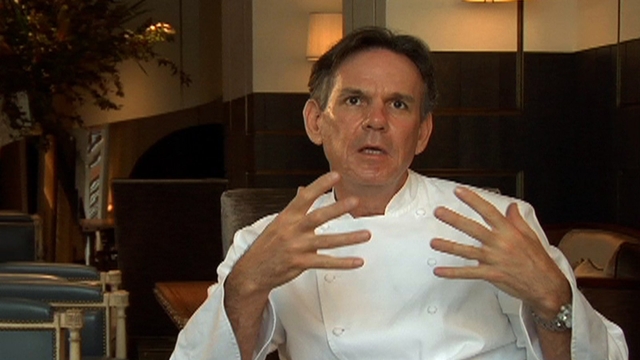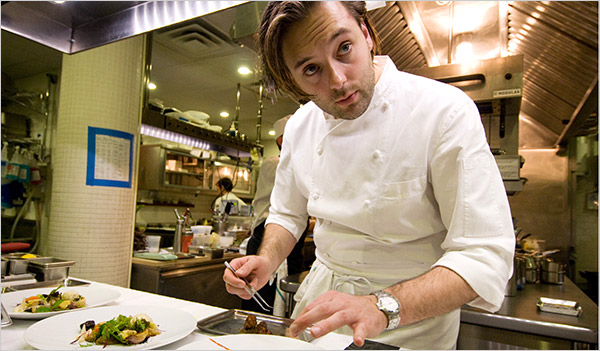REVIEW: 'A Matter of Taste: Serving Up Paul Liebrandt'
“I’m not insane, I’m an artist.” Those are the first words out of chef Paul Liebrandt’s mouth in the new documentary film A Matter of Taste: Serving Up Paul Liebrandt. The film is the result of ten years of interviews and late-night shoots by first-time director Sally Rowe, showing how difficult it can be to rise to the top of culinary culture in New York City.
A Matter of Taste offers a compelling portrait of a young man driven to cook, who uses plates as a canvas for a host of fanciful dishes. While the documentary captures the essentials of Liebrandt’s character, the inexperience of the director shows at times, and at 68 minutes, the material feels too thin in places.
Liebrandt grew up in London, England, and as he points out early in the film, he didn’t come from a family steeped in food culture, and he came upon the high-class culinary world by chance. This was when he bought a copy of chef Marco Pierre White’s renowned cookbook White Heat, inspiring the young Liebrandt to pursue his passion for cooking.
Liebrandt explains how several years working in a variety of high-class restaurants in England led to a “life-changing” job with French chef Pierre Gagnaire. From there, Liebrandt moved to New York, and at the age of 24 became the youngest chef to receive a three-star review from the New York Times.
Rowe’s film documents Liebrandt’s life from that point, covering the young chef’s attempts to find a job in a city where haute cuisine fell out of favour after the events of September 11, 2001. Liebrandt goes from restaurant to consulting job to restaurant, trying to find a place that will allow him to express his culinary creativity to its fullest extent.
It’s a testament to filmmaker Sally Rowe that she was able to follow Liebrandt for so long before putting the film together. Her mostly handheld camera work takes the viewer into steamy kitchens and darkened dining rooms. It often shows Liebrandt at his most passionate moments critiquing the work of subordinate chefs and speaking out about the constraints placed on him by employers.
It’s a treat to see Liebrandt at work, crafting fascinating dishes that sometimes appear to defy gravity. He is often seen bending almost double over the counter, painstakingly arranging garnishes with a pair of tweezers.
The shaky camera work is not overly distracting, though I found myself wishing Rowe had used a tripod in a few scenes. Night scenes would also have improved through better lighting – Liebrandt is sometimes obscured in shadow when he steps out of the kitchen. Nevertheless, since Rowe is a rookie filmmaker, I’m willing to give her some slack for these visual hiccups.
The real virtue of A Matter of Taste is Liebrandt’s willingness to talk about personal issues, like the demands his work puts on his social life, or the difficulties he faced finding a job that accommodated his creativity. It helps us understand his creative drive, and accept his frequent outbursts in the kitchen when his staff doesn’t meet his standards.
The section I liked the best was when Liebrandt spoke about the bad habits of many celebrity chefs, whom Liebrandt alleges spend little time in the kitchen once they make it big on TV or elsewhere. Liebrandt sees his place as in the kitchen, and we see him devote 20-hour days, seven days a week, to preparing a new restaurant for its opening.
Because the latter half of the film is built around the opening of the new restaurant, the film sometimes feels like an elite episode of Restaurant Makeover or Kitchen Nightmares. This does not necessarily detract from the experience, as we all like that payoff at the end of those shows when the restaurant is revealed and we catch up with the owners in a set of pre-credits intertitles. After the social and artistic difficulties Liebrandt tells us about, we collectively hope the new restaurant works for him, if only to preserve the man's sanity.
The only annoying part of A Matter of Taste is its length: at 68 minutes, I felt that Rowe could have included more of the footage she must have collected over the decade she followed Liebrandt. Granted, the film was originally produced as an HBO special. Still, I would have liked to see a longer, theatrical cut that expands on some of the details of Liebrandt’s life that are only briefly explored in the current version.
The film makes effective use of the material it does include, feeling tight and well-paced. It provides a fascinating window into the high and low points Liebrandt faced, a portrait of a man who still has many years ahead of him in the culinary industry. A Matter of Taste: Serving Up Paul Liebrandt gets three stars out of four.
Have you seen A Matter of Taste? What did you think? Did it offer a concise glimpse into high-stakes professional cooking? Or did it's short length skim over important details? Let me know what you think in the comments down below! You can also catch up on my most recent reviews here:
Margin Call | Happy Feet Two | Immortals | Vigilante Vigilante





